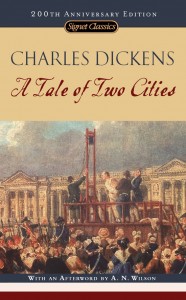 Dickens’ A Tale Of Two Cities begins and ends with some of the most famous lines in all of literature, ensuring that scarcely anyone over the age of maturity can expect to read it without at least some premonition as to its conclusion. And yet it nonetheless manages to devastate even the forewarned reader. Unlike most of his other novels, A Tale Of Two Cities focuses on a small cast of characters and largely eschews humor and subplots, probably because the historical backdrop, France’s Reign of Terror, is hardly conducive to the kind of bumbling, almost slapstick comedy characteristic of his other works. But perhaps the most salient difference is not an omission but a shift in the focus: the social criticism so characteristic of Dickens is here directed not at an unfeeling capitalism preying on the weak and disenfranchised, nor on those seeking to exploit this misery for personal gain, but on the masses of people who, given the opportunity, excelled even their oppressors in brutality.
Dickens’ A Tale Of Two Cities begins and ends with some of the most famous lines in all of literature, ensuring that scarcely anyone over the age of maturity can expect to read it without at least some premonition as to its conclusion. And yet it nonetheless manages to devastate even the forewarned reader. Unlike most of his other novels, A Tale Of Two Cities focuses on a small cast of characters and largely eschews humor and subplots, probably because the historical backdrop, France’s Reign of Terror, is hardly conducive to the kind of bumbling, almost slapstick comedy characteristic of his other works. But perhaps the most salient difference is not an omission but a shift in the focus: the social criticism so characteristic of Dickens is here directed not at an unfeeling capitalism preying on the weak and disenfranchised, nor on those seeking to exploit this misery for personal gain, but on the masses of people who, given the opportunity, excelled even their oppressors in brutality.
Dickens, too, it seems, concerned himself with that aspect of man that yearns for retribution and confuses punishment for justice, that immerses itself – at the expense of reason and responsibility – in the emotions of a mob. The Terror is one of history’s most important and hard-won lessons in how easily a noble impulse is transmuted into tyranny, and Dickens charts this descent masterfully, beginning with the depredations of France’s aristocracy (and England’s) that ultimately manifest themselves in the “revolutionary” character of the Defarges, the Jacques and the aptly named personage “The Vengeance.” In the final chapter of the final section of the book (which, recall, was serialized, like most of Dickens’ work), he describes the consequences of The Terror as being the predictable outcome of exploitation:
All the devouring and insatiate Monsters imagined since imagination could record itself, are fused in the one realization, Guillotine. And yet there is not in France, with its rich variety of soil and climate, a blade, a leaf, a root, a sprig, a peppercorn, which will grow to maturity under conditions more certain than those that have produced this horror. Crush humanity out of shape once more, under similar hammers, and it will twist itself into the same tortured forms. Sow the same seed of rapacious license and oppression ever again, and it will surely yield the same fruit according to its kind.
This is not an excuse, still less a justification: it is a warning. The “hammers” that have crushed humanity out of shape are poverty, exploitation, injustice, the “seeds” that have reaped this terrible harvest so perfectly encapsulated by the “insatiate monster,” Guillotine. To supporters and detractors alike, the guillotine was the preeminent symbol of the Revolution, a weapon of vengeance to the former and an inhumane monster to the latter. The irony is that it was initially conceived of as an equalizer, a humane way to kill without inflicting pain (contrast the swift death of decapitation, for example, with the suffering of a man hanged, drawn and quartered) and its implementation was universal: all capital crimes, regardless of severity or the social status of the guilty, were to result in decapitation.
Despite the novel’s historical scale, it is a remarkably personal work, beginning in romance and ending with a sacrifice so heroic and self-effacing as to be worthy of the Christian rhetoric Dickens uses to describe it. One man, believing himself corrupted beyond repentance (and Dickens wisely declines to go into much detail on this front) contrives to resurrect his good will for posterity, and it is to him rather than the amorous couple or the Terror that Dickens gives the novel’s dying voice: “It is a far, far better thing that I do, than I have ever done; it is a far, far better rest that I go to, than I have ever known.” Faced with the horrors of the guillotine and the subversion of the revolution, Dickens chooses instead to place his faith in the redemptive possibilities of the individual.